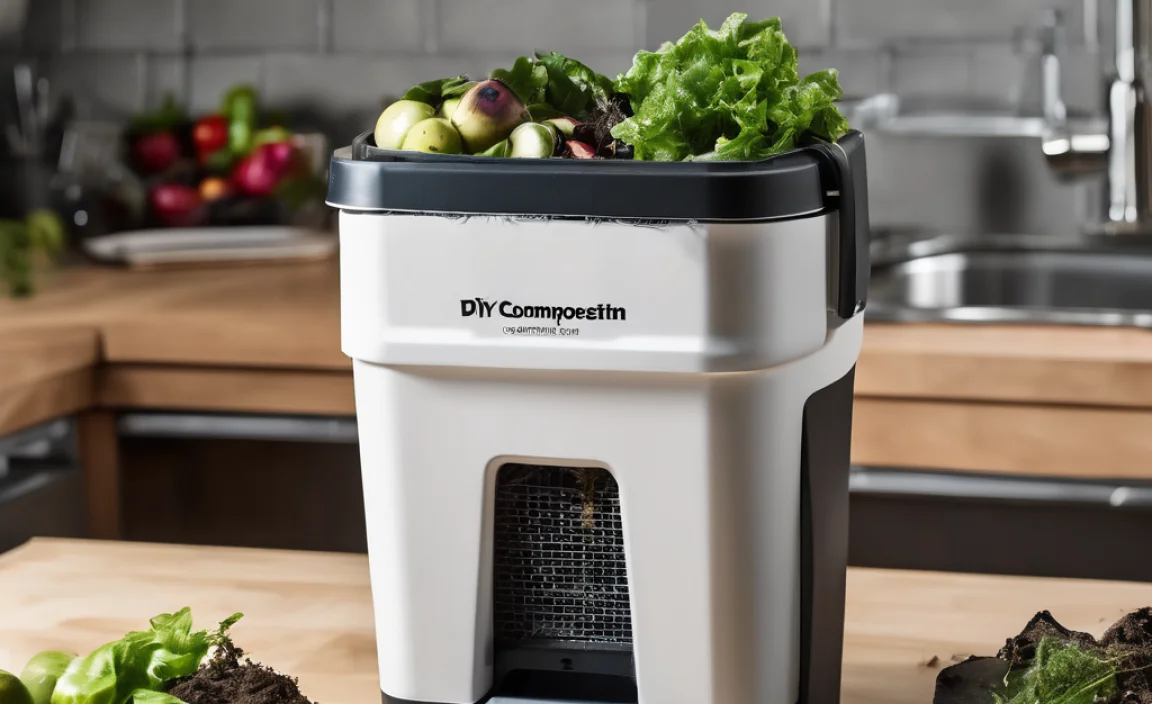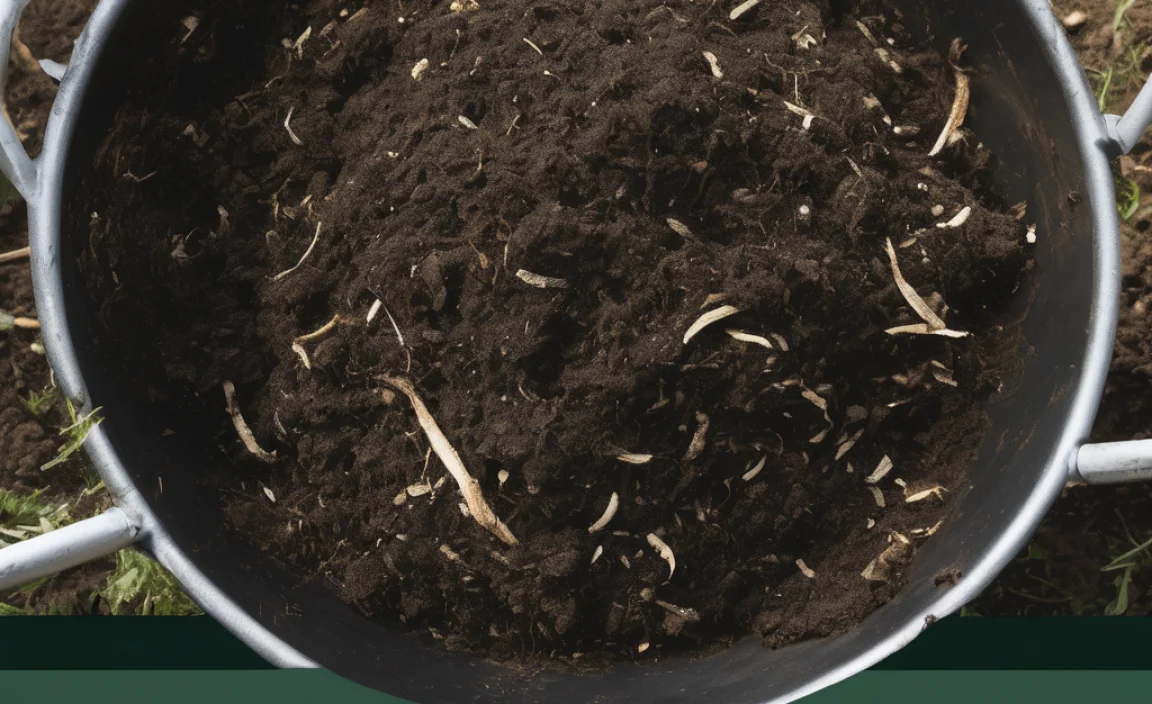Have you ever wondered what you can do with kitchen scraps? Imagine turning banana peels and eggshells into something useful. It’s not magic—it’s kitchen compost! This simple process can help your garden grow better. Plus, it reduces waste and helps the environment. Discover the exciting world of kitchen compost benefits and how it can make a difference.
Key Takeaways
- Kitchen compost benefits the environment by reducing landfill waste.
- Composting improves soil quality in your garden.
- It helps plants grow stronger and healthier.
- Composting reduces the need for chemical fertilizers.
- It teaches kids about recycling and sustainability.
Understanding Kitchen Compost Benefits
Composting might sound complex, but it’s really simple. By composting, you can turn food scraps into nutrient-rich soil. This soil is great for gardens. It helps flowers bloom and vegetables grow juicy. You can even use it for houseplants. But what exactly makes composting so beneficial? Let’s take a closer look and find out. Composting helps reduce trash in landfills. When trash sits in landfills, it releases gases harmful to our planet. Composting prevents this. It recycles nutrients back into the earth. This is one of the biggest kitchen compost benefits you can have at home.
- Composting decreases landfill waste.
- It enriches soil naturally.
- Reduces need for chemical fertilizers.
- Helps plants resist pests.
- Saves money on gardening supplies.
- Teaches sustainability to kids.
- Makes gardening more fun.
Creating kitchen compost isn’t hard. All you need are food scraps, a bin, and patience. Start by collecting items like fruit peels, vegetable scraps, and coffee grounds. Avoid meat, dairy, and oily foods. These attract pests and smell bad. Layer your scraps with dry materials like leaves or shredded paper. Turn the pile weekly to mix everything well. Soon, you’ll have rich compost for your plants. Fun Fact or Stats : Composting can reduce household waste by up to 30%!
The Magic of Compost in Soil
Have you ever touched soil that feels like soft, crumbly chocolate cake? That’s the magic of good compost. It transforms dry, hard dirt into rich, fluffy soil. This soil holds water better, helping plants stay hydrated. It also provides many nutrients that plants need to grow strong. Without compost, soil can become lifeless and hard. Do you think your garden could use a little magic? Try adding compost and see the difference. When you use compost, you give your plants the best start possible. They grow bigger, healthier, and produce more fruits and flowers.
Sustainability Starts at Home
What if you could help the Earth just by doing something simple at home? Composting is one way to do it! It teaches us to be kind to our planet. By recycling our kitchen scraps, we reduce the amount of waste we produce. This simple act can lead to big changes. Imagine if everyone in your neighborhood composted. The amount of waste would drop, and gardens would flourish everywhere. It’s a small step, but it makes a big impact. Can you think of ways to start composting today? Talk to your family and see how you can begin.
Composting: A Garden’s Best Friend
Why do gardeners love compost so much? It’s like a vitamin boost for plants. Compost provides essential nutrients that plants crave. These nutrients help plants grow strong roots and vibrant leaves. Healthy plants are better at fighting off pests and diseases. With compost, your garden can thrive without the need for harsh chemicals. Think of compost as a natural helper. It works quietly in the background, making everything grow better. Have you ever seen a garden full of colorful flowers and lush vegetables? Chances are, compost helped in making it beautiful.
Comparing Compost and Chemical Fertilizers
Is compost better than chemical fertilizers? Let’s compare the two. Compost is natural and safe. It enriches the soil without harming the environment. Chemical fertilizers work quickly but can damage soil over time. They often run off into water bodies, causing pollution. Compost releases nutrients slowly, feeding plants over time. It also improves soil structure and water retention. With compost, you build a healthier ecosystem for plants and wildlife.
| Feature | Compost | Chemical Fertilizers |
|---|---|---|
| Source | Natural | Manufactured |
| Effect on Soil | Improves | Can degrade |
| Nutrient Release | Slow | Fast |
| Environmental Impact | Low | High |
It’s clear that compost has many advantages. It not only helps plants but also protects the environment. Choosing compost over chemicals is a choice for a healthier planet. Fun Fact or Stats : Composting can reduce the need for chemical fertilizers by 50%!
How Compost Affects Plant Growth
Have you ever seen a plant grow quickly and wondered how? Compost might be the secret! It’s packed with nutrients like nitrogen, phosphorus, and potassium. These help plants grow tall and strong. Compost improves soil texture, allowing roots to spread easily. It also helps soil retain moisture, so plants don’t dry out. Using compost is like giving your garden a head start. Imagine your plants growing faster and producing more fruits. Wouldn’t that be amazing? With compost, this is possible. It gives plants everything they need to thrive.
The Eco-Friendly Choice
Did you know composting is one of the best eco-friendly choices you can make? By composting kitchen scraps, you reduce waste that ends up in landfills. This simple act helps cut down on harmful emissions. Composting also enriches soil naturally, reducing the need for chemical fertilizers. It’s a win-win for your garden and the planet. Have you thought about how you can be more eco-friendly at home? Composting is a great place to start. It’s a small step with a big impact on sustainability.
Compost and Water Conservation
Have you ever wondered why some gardens need less water? The secret might be compost. Compost improves soil structure, helping it hold water better. This means plants need less frequent watering. During dry spells, compost helps keep plants hydrated. It acts like a sponge, soaking up rain and slowly releasing it. By using compost, you can conserve water and help the environment. Who knew saving water could be so simple? Next time you garden, think about how compost can help with water conservation.
Conclusion
Kitchen composting is a small step with big benefits. It reduces waste, enriches soil, and helps plants thrive. By understanding kitchen compost benefits, you can make a positive impact at home. Composting is a simple yet powerful way to care for the earth. Start composting today and enjoy a greener, healthier garden.
FAQs
Question: What can I compost from my kitchen?
Answer: You can compost fruit peels, vegetable scraps, coffee grounds, and eggshells. Avoid meat, dairy, and oily foods as they attract pests and produce odors. By composting these items, you enjoy kitchen compost benefits like enriching soil and reducing waste.
Question: How does kitchen composting help the environment?
Answer: Kitchen composting reduces landfill waste and cuts down harmful emissions. It enriches soil naturally, promoting healthier plant growth. These kitchen compost benefits contribute to a more sustainable environment.
Question: Is composting easy to start at home?
Answer: Yes, composting is easy! Collect food scraps like fruit peels and coffee grounds. Use a compost bin to layer them with dry materials like leaves or paper. Turn the pile weekly. Soon, you’ll have rich compost for your garden.
Question: How does compost improve soil quality?
Answer: Compost adds nutrients and organic matter to the soil. It improves soil structure and water retention. This helps plants grow strong and healthy. Composting naturally enhances soil without chemicals, benefiting your garden and the environment.
Question: Can composting save money?
Answer: Yes, composting can save money by reducing the need for fertilizers. It provides nutrients to plants, so you spend less on garden supplies. Enjoy kitchen compost benefits like enriching soil and reducing costs.
Question: What’s the difference between compost and fertilizers?
Answer: Compost is natural and improves soil over time. Fertilizers are manufactured and can degrade soil. Compost releases nutrients slowly and supports a healthier ecosystem. It is eco-friendly, while fertilizers may harm the environment.



